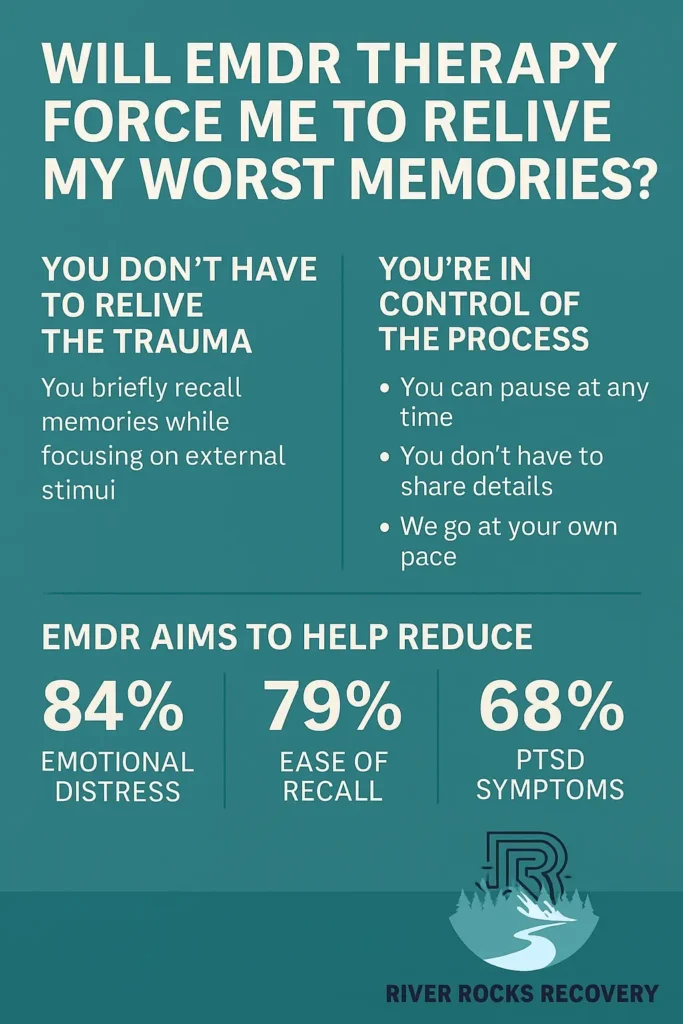In early recovery, your world can feel painfully quiet. The chaos is gone, but so is the cushion. You’re left alone with memories that no longer stay numbed. Sometimes it feels like you’re walking barefoot through broken glass—unsure where to step, and afraid that therapy might only make the pain louder.
If you’ve heard of EMDR Therapy in Middletown, Ohio, you might be wondering: Will it help me heal—or just make me relive the worst moments of my life?
That fear is real. And it deserves an honest, hopeful answer.
EMDR Therapy Isn’t About Re-Traumatizing You
Let’s start here: EMDR (Eye Movement Desensitization and Reprocessing) is not exposure therapy. You’re not forced to sit in your trauma, speak it aloud in vivid detail, or re-experience every painful second. Instead, EMDR gently helps your brain “unstick” memories that are trapped in survival mode.
Think of it like closing too many tabs on a computer. When trauma remains unprocessed, your nervous system keeps reacting like the danger is still happening. EMDR uses bilateral stimulation—such as eye movements, tapping, or sounds—to help your brain reprocess those memories safely.
You don’t have to relive the fire. You just have to walk past the ashes, with support beside you.
You Stay in Control—Always
The biggest misconception about EMDR Therapy is that it’s overwhelming or intrusive. But here’s the truth:
You decide what you want to talk about. You choose when and how.
At River Rocks Recovery, EMDR is done with trauma-informed care. That means:
- You are never pushed to talk before you’re ready
- You can pause at any time
- We teach grounding and coping tools before processing begins
- We check in with you regularly, both during and after sessions
You may be carrying things that feel too big to say out loud. That’s okay. EMDR works even if you don’t say every detail. The brain knows the memory—and with the right tools, it can learn to store it safely.
What It Feels Like to Do EMDR in Early Recovery
For many people, early recovery feels like waking up in a room you don’t remember falling asleep in. You’re disoriented. Emotions return in sharp flashes. You miss the anesthesia that substances provided—even when you know they were hurting you.
This is where EMDR can help. It’s not just about healing past trauma—it’s about making space for your future. You may notice:
- Reduced anxiety or nightmares
- Less emotional flooding from small triggers
- More clarity in your thinking
- A growing sense of safety inside your own body
That safety is everything in recovery. It’s what lets you start rebuilding—not just staying sober, but staying connected to why you wanted to heal in the first place.

EMDR Can Be Especially Powerful for People in Recovery
Many people in recovery used substances to cope with unresolved trauma. Whether it was childhood neglect, betrayal, loss, abuse, or emotional pain that never had words—substances became the buffer.
Now that buffer is gone.
That’s why EMDR can be so powerful in early recovery. It gives your nervous system a new way to handle old pain—without needing to shut down, check out, or self-destruct. Studies have shown EMDR helps reduce:
- Cravings
- Relapse risk
- Co-occurring anxiety or PTSD
- Emotional numbness
At River Rocks Recovery, we integrate EMDR as part of our trauma-informed approach because we’ve seen what happens when healing becomes possible. We’ve seen clients walk in guarded, exhausted, and afraid… and walk out months later feeling safe enough to exhale.
But What If I’m Not Ready?
Then that’s exactly where we’ll start.
You don’t have to arrive with courage. You don’t have to be “ready.” You just have to be curious. And tired enough of carrying this pain alone that you’re willing to set it down, piece by piece.
Sometimes EMDR isn’t the first thing we do in treatment. Sometimes it comes later—after your body feels more regulated, after you’ve built trust with your therapist, after you’ve had some practice with healthy coping.
But even now, just asking this question—Could EMDR help me?—means something inside you wants to move forward.
We’ll meet you there.
“I thought talking about trauma would break me. But EMDR didn’t break me—it helped me gather the pieces of myself I thought were gone forever.”
– River Rocks Client, 2023
Frequently Asked Questions About EMDR Therapy
What does EMDR actually involve?
During EMDR, your therapist guides you through a memory or theme while using a form of bilateral stimulation—often eye movements or tapping. This activates both sides of the brain and helps your nervous system reprocess the memory as something past, not current.
Do I have to share everything I remember?
No. EMDR works even if you don’t share the full story out loud. You can keep the details to yourself while still doing the work. Your therapist will support your process without needing to know everything.
Will I cry or get overwhelmed?
You might get emotional, yes—but EMDR is designed to happen in a resourced state. That means you’ll have tools in place to stay grounded, and your therapist will never leave you in a spiral. You can always pause, slow down, or stop.
How long does EMDR take to work?
It varies. Some people feel relief in just a few sessions, while others take more time depending on the complexity of their trauma. EMDR is not a quick fix—but many clients say it’s faster and more effective than traditional talk therapy.
Is EMDR safe in early recovery?
Yes, when done properly. At River Rocks Recovery, we ensure clients are emotionally stable enough to begin EMDR. If you’re still detoxing or feeling highly unstable, we may wait—but EMDR can be a safe and supportive part of your healing process.
You’re Not Too Broken. You’re Becoming
The fear that therapy will crack you open is valid—especially when you’ve spent years keeping it together just enough to survive.
But you’re here now. Reading this. That means a part of you is already healing.
Whether you start EMDR right away or simply ask questions for now, you’re allowed to move at your own pace. Recovery isn’t about racing forward. It’s about coming back to yourself—gently, bravely, one breath at a time.
Ready to learn more about EMDR Therapy in Middletown, Ohio?
Call (888) 905-6281 or visit River Rocks EMDR Therapy. You don’t have to carry this alone. We’re here—and the next step doesn’t have to be big. Recovery in West Chester, Hamilton, Monroe & Dayton, starts with support that understands. Explore our servuces and find safe ways to process your memories. Just honest.




























